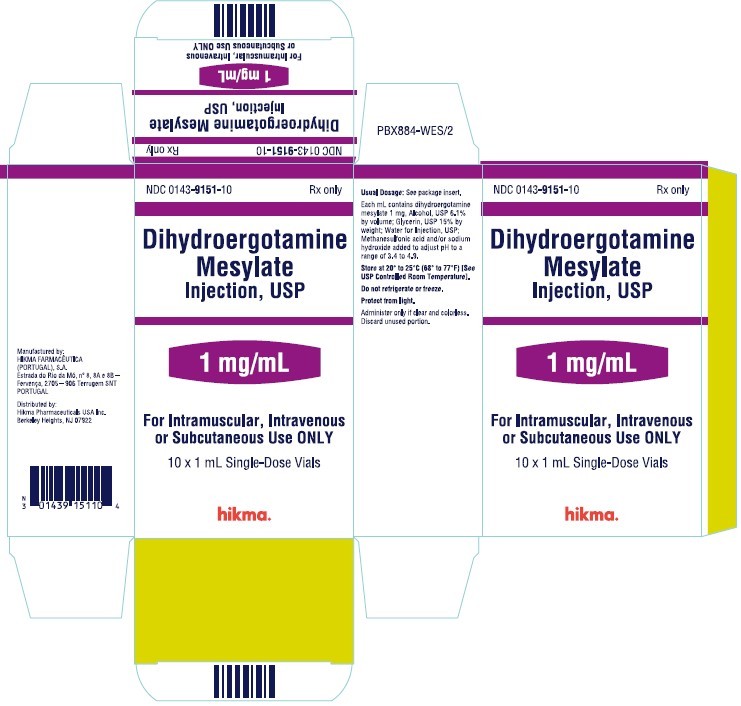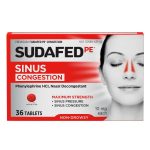
dihydroergotamine – injection, D.H.E.45
WARNING: This medication has rarely caused a serious lack of blood flow to the hands and feet (peripheral ischemia) or to the brain, which could cause a stroke. The risk is increased when this medication is taken with other drugs that can affect the removal of dihydroergotamine from your body. Examples include azole antifungals (such as ketoconazole, itraconazole), macrolide antibiotics (such as clarithromycin, erythromycin, troleandomycin), HIV protease inhibitors (such as ritonavir, nelfinavir, indinavir), among others. See also Drug Interactions section. USES: Dihydroergotamine is used to treat migraine headaches and cluster headaches. It is not recommended for migraines that affect only one side of the brain (hemiplegic migraine) or the base of the brain/neck area (basilar migraine), or to prevent migraines from occurring. Dihydroergotamine is an ergot medication that helps narrow widened blood vessels in the head, reducing the throbbing effects of these headaches. HOW TO USE: Read the Patient Information Leaflet provided by your pharmacist before you start using dihydroergotamine and each time you get a refill. If you have any questions, consult your doctor or pharmacist. Inject this medication into a vein, into a muscle, or under the skin as directed by your doctor. Dosage is based on your medical condition and response to treatment. Usually, this medication should be used only as needed. It is not meant for long-term use. This medication works best if taken at the first signs of the headache. If the headache worsens, the medication may not work as well. If the headache returns or there is no relief from the first dose, you may repeat the dose 1 hour later, but only if instructed to do so by your doctor. If given into a muscle or under the skin, a third dose may be given 1 hour after the second dose if needed. Do not exceed the recommended dosages. If self-administering this medication at home, learn all preparation and usage instructions from your healthcare professional. Check the solution visually for particles or discoloration before use. If present, do not use the liquid. Learn how to store and discard medical supplies safely. Other "ergot" drugs (e.g., ergotamine, methysergide) or "triptan-type" drugs (e.g., sumatriptan) should not be used within 24 hours of this drug. Inform your doctor if you notice increased use of this medication, the medication not working as well, a worsening of headaches, an increase in the number of headaches, or use of this medication for more than 2 headache episodes a week. Your doctor may need to make changes to your medication. Weigh the benefits and risks of using this medication during pregnancy. It is recommended that both men and women use two forms of birth control while using this medication. Consult your doctor before breastfeeding.
SIDE EFFECTS: Dizziness, drowsiness, headache, nausea, vomiting, diarrhea, flushing, or increased sweating may occur. If any of these effects persist or worsen, inform your doctor. Remember that your doctor has prescribed this medication because the benefit to you is greater than the risk of side effects. Many people using this medication do not have serious side effects. Inform your doctor right away if you experience any serious side effects, including: slow/fast/irregular heartbeat, tingling/pain/coldness in the fingers/toes, whitish fingers/toes/nails, loss of feeling in the fingers/toes, bluish hands/feet, muscle pain/weakness in the arms/legs, severe stomach/abdominal pain, lower back pain, little or no urine. Get medical help right away if any of these rare but very serious side effects occur: difficult/painful breathing, chest pain, confusion, slurred speech, weakness on one side of the body, vision problems. A serious allergic reaction to this drug is rare. However, seek medical help right away if you notice any symptoms of a serious allergic reaction, including: rash, itching/swelling (especially of the face/tongue/throat), severe dizziness, trouble breathing. This is not a complete list of possible side effects. Inform your doctor or pharmacist of any other effects not listed above.
PRECAUTIONS: Inform your doctor or pharmacist if you are allergic to this medication or other ergot alkaloids, or if you have any other allergies. This product may contain inactive ingredients that can cause allergic reactions or other problems. This medication should not be used if you have certain medical conditions. Speak with your doctor or pharmacist if you have: blood circulation disease, uncontrolled high blood pressure, heart or blood vessel disease, liver or kidney disease, severe blood infection, or recent blood vessel surgery. Before using this medication, inform your doctor or pharmacist of your medical history, especially of: diabetes, family history of heart disease, controlled high blood pressure, high cholesterol, stomach/intestinal problems, smoking/tobacco use, and permanent ending of menstrual periods. Limit alcohol consumption and avoid tobacco/nicotine products while using this medication. These substances can increase the risk of serious side effects. Inform your doctor or dentist of all the products you use, including prescription drugs, nonprescription drugs, and herbal products, before having surgery. This medication may harm an unborn baby and should not be used during pregnancy. It is recommended that both men and women use two forms of birth control while using this medication. Consult your doctor before breastfeeding.
QUESTION
DRUG INTERACTIONS: See Warning and How to Use sections. Keep a list of all the products you use and share it with your doctor and pharmacist. Do not start, stop, or change the dosage of any medicines without your doctor’s approval. Some products that may interact with this drug include: bronchodilators/decongestants/stimulants, other medications that affect dihydroergotamine removal from the body, boceprevir, mifepristone, telaprevir, HIV NNRTIs, certain combination HIV medication, certain antidepressants, and others. If you also take "triptan" migraine drugs, separate your doses to reduce the risk of serious side effects. Check the labels on all your medicines because they may contain ingredients that could increase your heart rate or blood pressure. Consult your pharmacist about the safe use of these products. In case of overdose, contact a poison control center immediately. Store this medication at room temperature away from light and moisture. Do not flush medications down the toilet or pour them into a drain. Properly discard this product when it is expired or no longer needed.
Migraine Treatments:
Explore your options.


